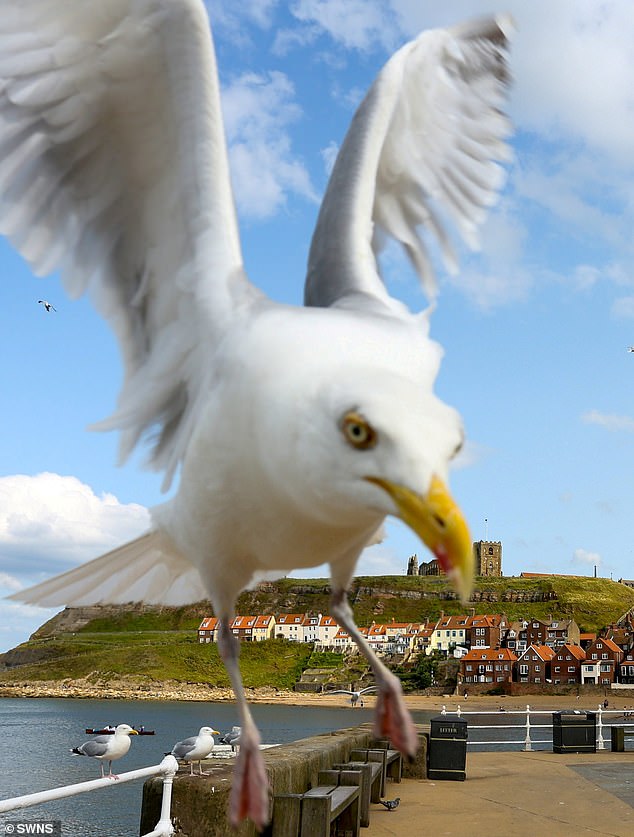Many people find it tempting to dismiss the threat posed by gulls as comic, or to make flippant comparisons with Hitchcock’s thriller The Birds.
But not the increasing number of those who, from direct experience, know there is nothing funny about the menace that gulls now pose, not only in coastal communities, but in the centre of our largest towns and cities.
There’s no question that these birds have become ever bolder, and that they pose a very serious risk of injury, particularly to the elderly, the vulnerable and young children.
Sooner or later, swooping attacks from gulls will cause serious injury or even fatalities.
We, and many of our colleagues in parliament, have been inundated with complaints from constituents who have had to deal with this scourge.
We’ve heard from people who have required medical attention, and in some cases even hospitalisation, because of attacks by birds.
The elderly are particularly at risk from injuries as a result of falls. Toddlers face serious damage if they ingest guano – the highly toxic droppings – which may land on them or in their prams or buggies.

Seagulls are a familiar menace to those in Scotland’s coastal communities
And everyone is inconvenienced and intimidated by the sheer number of these creatures, who face little or no deterrent for their increasingly aggressive attacks.
It is having a significant effect on businesses, particularly in the hospitality sector, and has left some people in the worst affected areas anxious about stepping out in public.
There may be several factors behind the rise in this problem, including the failure to keep on top of basic tasks such as refuse collection and changes to the birds’ natural habitat, whether man-made or climate-related, but the chief reason is undoubtedly the reluctance of the authorities to take active steps to control the problem with effective deterrents.
When quizzed on the matter at Holyrood, ministers have been inclined to minimise the issue and tend to turn instead to the question of conservation and the declining number of seabirds.
Everyone is in favour of protecting genuinely endangered species, but it is an absurd state of affairs when government disregards a clear and present danger to the public in favour of a theoretical risk to creatures that are clearly thriving in, and indeed dominating, populated areas that are not their natural territory.
Those skewed priorities are a direct consequence of the role played by NatureScot, the Scottish government arms-length body which is responsible for protecting bird numbers in Scotland, but is also the authority responsible for approving or rejecting licences to control them.

Fergus Ewing has criticised quango NatureScot’s reluctance to tackle the seagull menace
That creates a clear conflict of interest and – judging by their actions – NatureScot have come down firmly on the side of the gulls, rather than the people whose lives are being made a misery by their behaviour.
Last year, without any warning and without any explanation, NatureScot stopped issuing licences for the control of gulls altogether. When we both raised the matter and pressured them for action, they were belatedly embarrassed into granting limited permissions.
Many colleagues across the political divide have told us that their constituents have raised similar concerns, which is why the debate this week has attracted cross-party support.
But NatureScot’s instinct is clearly to oppose any effective means to deal with the problem. In Eyemouth, after a series of gull attacks, they made the preposterous suggestion that dogs should be employed to scare birds away.
That is, frankly, bonkers.

Douglas Ross is demanding the Scottish Government takes serious action to deal with the growing problem of seagulls
The sheer impracticality of this suggestion is an indication that this unaccountable quango is failing to take the problem seriously.
When they do not dismiss it or prioritise hypothetical benefits for seabirds over real improvements for people, their proposed solutions are increasingly bizarre and unrealistic.
They impose significant costs – in some instances running into six figures – on businesses.
And they’ve been encouraged in this intransigent and unreasonable position by government ministers to whom, in theory, they are accountable. Yet when questioned, those same ministers seem happy to parrot the lines produced by the apparatchiks at NatureScot.
People are sick and tired of the failure of the government to act to deal with what has become a serious threat to public safety, as well as a blight on our villages, towns and cities. MSPs have an opportunity to correct that this week, and produce an effective means to tackle this menace.